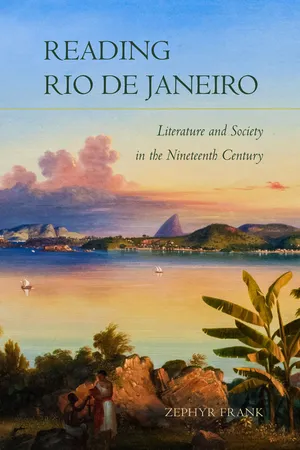
- 248 pages
- English
- ePUB (mobile friendly)
- Available on iOS & Android
About this book
Reading Rio de Janeiro blazes a new trail for understanding the cultural history of 19th-century Brazil. To bring the social fabric of Rio de Janeiro alive, Zephyr Frank flips the historian's usual interest in literature as a source of evidence and, instead, uses the historical context to understand literature. By focusing on the theme of social integration through the novels of José de Alencar, Machado de Assis, and Aluisio Azevedo, the author draws the reader's attention to the way characters are caught between conflicting moral imperatives as they encounter the newly mobile, capitalist, urban society, so different from the slave-based plantations of the past. Some characters grow and triumph in this setting; others are defeated by it. Though literature infuses this social history of 19th-century Rio, it is replete with maps, graphs, non-fiction sources, and statistical data and analysis that are the historian's stock-in-trade. By connecting a literary understanding of the social problems with the quantitative data traditional historical methods provide, Frank creates a richer and deeper understanding of society in 19th-century Rio.
Tools to learn more effectively

Saving Books

Keyword Search

Annotating Text

Listen to it instead
Information
Table of contents
- Cover
- Copyright
- Title Page
- Dedication
- Contents
- Acknowledgments
- Preface
- Introduction: The Brazilian Bildungsroman
- Interlude: The Problem of the Individual and Society
- Conclusion
- Notes
- Works Consulted
- Index
Frequently asked questions
- Essential is ideal for learners and professionals who enjoy exploring a wide range of subjects. Access the Essential Library with 800,000+ trusted titles and best-sellers across business, personal growth, and the humanities. Includes unlimited reading time and Standard Read Aloud voice.
- Complete: Perfect for advanced learners and researchers needing full, unrestricted access. Unlock 1.4M+ books across hundreds of subjects, including academic and specialized titles. The Complete Plan also includes advanced features like Premium Read Aloud and Research Assistant.
Please note we cannot support devices running on iOS 13 and Android 7 or earlier. Learn more about using the app